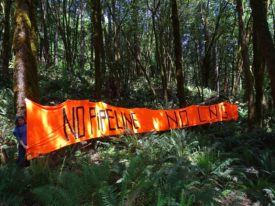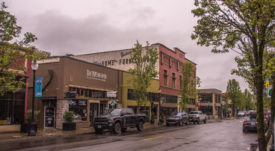Eric de Place
For my money, the most important reading stop to make this weekend is at citytank, Dan Bertolet’s nascent project. It’s a think tank about city issues (duh) with a tenor that is part encomium and part wonkfest. Dan’s lined up a roster of heavy hitters to do the writing, which he will no doubt complement with his own able voice. citytank. Go there now.
Also in the transportation and land use arena, I recommend Todd Litman’s salvo, “The First Casualty in a Non-Existent War” (the war on cars, that is), and Elly Blue of Grist on tearing down urban freeways to make room for bikes.
On energy, check out Montanan Ed Gulick as he blasts coal exporting as a major threat to his state’s prosperity. And take a look at Bonnie Frye Hemphill’s terrific short piece, “The Risky Business of Turning On the Lights,” at the Climate Solutions blog:
…history is littered with violence, repression and genocide fueled by oil and atomic bombs. But clean and efficient energy? I dare you to name the nation or paramilitary arming for war with caulking guns.
Lastly—and because I’m eating at a spendy French place tonight—I think it’s worth reading Felix Salmon unpack “The Crowded Restaurant Conundrum” for New York magazine. From there, you might like to traipse over to Vanity Fair and find A. A. Gill’s hilarious gut-buster, “Tour De Gall,” which is about the worst restaurant in the world, and why it’s so popular with the rich and famous.
Alan
Like most people, I’ve mostly been reading about Libya and Japan this week—oh, and a pile of essays about governance issues, which I’ll save for another day. But I do recommend this light-hearted but on-target blog post about the current spate of overheated rhetoric aimed at bike lanes and this fascinating piece on the importance of collective action to human evolution.
As the director of (and chief fundraiser for) a nonprofit that raises charitable dollars to put high-quality information online for free (where it’s consumed by tens of thousands of mostly nonpaying readers), I’m also watching with fascination as the New York Times prepares to erect a pay wall around some of its content. Will pay-per-view finally take hold on the internet? I’m doubtful, but society does fairly desperately need a new revenue model to support real journalism.
Clark
US trends: fewer deaths, fewer births. In fact, teen births in the US are at their lowest level ever recorded—but remain high by international standards.
Road tolling is shaping up to be a major political hot button, because of its ability to both praise and criticism from all parts of the political spectrum. (See, e.g., praise for congestion pricing from the urbanist left and the anti-urbanist right, and equally passionate critiques of highway tolling from both left and right.) The debate over HOT lanes is already warming up in Olympia—but expect to hear an awful lot more about road tolling after the 520 bridge tolls kick in next month.
A new report argues that living in a transit-friendly neighborhood saves energy. Worth it for the very nice visuals—but having read through the report itself, there’s not a lot of new data there.
Sightline pal & former staffer Roger Valdez argues that both sides of Seattle’s Alaskan Way Viaduct debate can find common ground in supporting vibrant, compact, and well-designed cities.
Eric Hess
I included it in yesterday’s news roundup, but I’ll link to it again. Dominic Holden’s feature in the Stranger takes a hard look at many of the issue’s surrounding Seattle’s deep-bore tunnel. The article is anything but boring.
And finally, these interactive graphics at the New York Times really bring to light the extent of the devastation Japan is going through (plus, kudos to this 83-year-old woman who outran the tsunami on her bike!).








